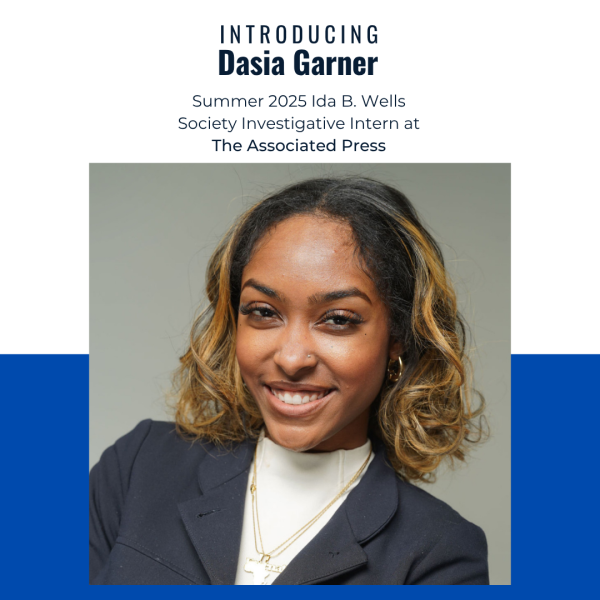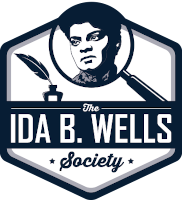Dasia Garner, a senior multimedia journalism major at North Carolina A&T State University, is a member of the 2025 cohort of the Investigative Reporting Internship. As part of Dasia’s internship with the Associated Press, she worked out of Washington, D.C., where she did some reporting from the White House and the Capitol and worked on a major project: School crossing guards face life-threatening dangers on the job.
Dasia Garner knew from a young age that she wanted to be a journalist.
“I want to be a voice,” she said. “I do believe that was my gift. Because when I hear stories, my face lights up. I get curious. I want to know, especially with investigative reporting, why did this happen? Who is this happening to? How is this affecting you? And what can we do to better push this stuff out to make sure that we are transforming lives?”
She shared some insights from her five-month experience.
The Ida B. Wells Society: What inspired you to apply to the Ida B Wells society internship?
Dasia Garner: My professor. I come from a broadcast background, so working with print publications, that’s just not in my comfort zone. But he was telling me, “Hey, you need to expand what you know. You need to deepen your understanding and deepen the different platforms that you are telling me stories on.” I love to dig deep. I love to uncover the unknown, but I didn’t even think I was gonna get it because I don’t have a lot of experience. So honestly, I took the chance. … This is what I want to do. This is what I love to do. But I just didn’t feel like I had enough experience to do it.
IBWS: How did this story come about?
DG: [The newsroom] got a tip from San Francisco. And [Society co-founder] Ron Nixon gave me the tip. I was excited, but I had to figure out what’s going on. Why are there crossing guards who are being hit? Who’s in charge of these crossing guards? My mind just kept running through questions. You know, how can we tell this story, and what can we uncover that nobody knows?
I did a data spreadsheet on how many crossing guards were injured and included whether or not the drivers had been criminally charged. Nobody else has this data spreadsheet because we made it using worldwide data from the last 10 years. Federal companies or federal agencies, they don’t track this data. I put in a lot of work to make sure that we can make that claim that, hey, this is a real issue.
IBWS: What was it like working on this investigation with eight other publications?
DG: It was reassuring that this is where I’m supposed to be as a young journalist. It’s sometimes hard. My boss (Ron Nixon) always said, “There’s no such thing as impostor syndrome,” and he was so right. I walked in there where I was on those calls, I knew what I was talking about. I answered the questions because I really, really was invested into the investigation.
IBWS: What is it like having this project published?
DG: There’s no feeling I can compare it to; this is new for me. I do know that it increases my drive, because, in all honesty, investigations are long, you go in day and night trying to figure out what’s going on. And it’s not easy, because if it was easy, everybody would have a story. Just to see the long-form investigation, to see the people, like the pictures that we have—I didn’t take them, but I found those people. So it’s just a different level of connection with that investigation.
IBWS: What would you say is the best skill that you gained from your internship?
DG: The ability to connect. It’s important that before you do journalism work, you have to understand the art of connecting, because that’s how I got great sound bites—because I connected with the person. We have to realize that the only way that we have our jobs is because we connect with the people, and people are giving us information. So any time that I interview someone, anytime that I’m thinking of a story, I’m thinking about how can I connect with this person? To number one, know that I feel you, I understand you, and I’m going to do the necessary job to bring this story to life.
IBWS: As a broadcast journalism major, do you feel like there are things that you’ll be able to take back from this experience to broadcast?
DG: I’m interested in both now. Before, you couldn’t pay me to sit down and write a long, drawn out story. I knew I could do it, but I wasn’t connected to it the way that I am broadcast, but with this internship, it has changed my mind and how I report. So I connect myself with the story a little bit, and there are questions that I’m curious about.
And the benefit of what I did, I was actually able to put together a video. So this is right up my alley. It just feels good to know the investigation more than anybody else knows, because it’s a real hard topic, but it’s also like I know the ins and outs, and now I know this type of stuff, so it just feels good, and I feel brighter, I feel smarter, and I feel powerful to be able to be a part of something that is, you know, changing lives day by day.
IBWS: Would you recommend the internship program to journalists who are in your position right now?
DG: This is a life-changing internship. Even if you don’t like print, the Investigative Reporting Internship will change the way you report. It will deepen your reporting.
You just don’t see a lot of opportunities like this. That’s what stuck out to me. If you go into these newsrooms, you’ll see they don’t look like us. So we have to be in these rooms. [My experience] reminded me once again, that there is a seat at a table. You just have to be exposed to it.
IBWS interviewed Ron Nixon, who is director of the Associated Press Local Investigative Journalism Program and co-founder of the Ida B. Wells Society, about Dasia’s experience and the project she helped produce. Nixon called the assignment “one of the most ambitious projects we’ve done with an intern.”
IBWS: So, what are your thoughts about the role Dasia Garner played in producing this story?
RN: This is the first time one of our interns has ever pulled something this significant together and kept track of it every step of the way. She literally started from scratch. She did it. She led it. Most of the time with interns, they are asking us, ‘What do you want me to do?’ But in this case, I just handed it to her and said: ‘Run with it.’ She just took it and ran with it. That’s just something you don’t see often. It was amazing to watch it all unfold. Typically, you give interns something simple or less complicated.
Nixon said he playfully told Garner after she completed the project to show it to her professors at North Carolina A&T as proof that she is ready for the world.
I told her to say, ‘Here you go, and hand me my degree.’ She did something that you don’t see folks with years of experience do. They often don’t nail things down the way she did.
Nixon also said the process showed coaching and support matter and served as a reminder that reporters don’t fail or succeed alone.
She’s an intern … She got too involved at times, but we pulled her in and told her, ‘Don’t just say it, show it’ – in the data, pull all the stuff you’ve gathered together. We paired her with a couple of people, but she drove it to the finish line.
Applications for the Summer 2026 Investigative Reporting Internship are now open. Students from traditionally underrepresented groups and those attending HBCUs and MSIs are especially encouraged to apply for a paid, full-time summer investigative reporting internship with some of the nation’s top publications.

